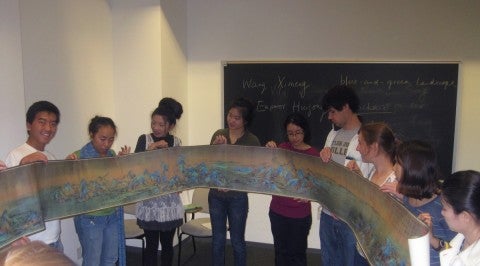Biennale Architettura 2021, the 17th International Architecture Exhibition organized by La Biennale di Venezia held this year from May to November, poses the question of “How will we live together?” to architects around the world at a time when economic disparities and political divides are rapidly widening. In the “Co-Habitats” section of the exhibition, Farès el-Dahdah, Rice University professor and director of the Humanities Research Center, Alida Metcalf (Rice University), David Heyman (Axis Maps), and Sergio Burgi (Instituto Moreira Salles ) will be showcasing their research and project imagineRio, a searchable digital atlas that displays the social and urban evolution of Rio de Janeiro.
How will we live together?: (Bottom image)
With support from the Getty Foundation and in partnership with Instituto Moreira Salles and Axis Maps, the Humanities Research Center (HRC) at Rice University has embarked on a project to digitally integrate historical photography and temporally accurate cartography into imaginerio.org, a searchable atlas that charts changes in Rio de Janeiro’s landscape and topography over time, as the city has existed and as it has been imagined. The project is digitizing 4,000 photographic views of Rio in the Moreira Salles collection while integrating them into their temporal cartography, greatly expanding the variety of geo-located visual representations of Rio accessible to researchers.
[Image: Marc Ferrez, “View of the Largo da Carioca with the Fountain of 35 Spouts in the Background,” 1890]
Sneak peek of the project: (Top image)
The imaginerio.org interface offers new insights for historians to visualize their specific sites of inquiry, for architects and urbanists to see proposed design projects in situ, and for literary scholars to map out scenes and narrative arcs in novels. Users are able to see how spaces across Rio lent themselves to living together, in what conditions, and also how successive generations have imagined other ways to live together.
Additional information on the exhibition can be found on the Biennale Architettura site here.
Prof. Farès el-Dahdah will join the Department of Art History in Fall 2021 and lead a new graduate seminar course, “HART 512: Platforms of Knowledge in a Wide Web of Worlds.”
El-Dahdah received his undergraduate degrees in fine arts and in architecture from the Rhode Island School of Design and went on to pursue his graduate studies in urbanism and architectural theory at Harvard University's Graduate School of Design. Following a two decade long professorial track at Rice University's School of Architecture, he was appointed director of the Humanities Research Center (HRC) in 2012 and Professor of the Humanities in 2014. El-Dahdah has written extensively on Brazil's modern architecture and has been involved in a number of collaborative projects with Casa de Lucio Costa and Fundação Oscar Niemeyer, two Brazilian cultural foundations on the boards of which he serves. In 2015-16, el-Dahdah co-led a John E. Sawyer Seminar on the Comparative Study of Cultures Cultures, titled, “Platforms of Knowledge in a Wide Web of Worlds: Production, Participation, and Politics” and, is currently co-leading a Digital Art History Grant, titled “Situated Views of Rio de Janeiro: 19th and Early 20th-Century Photography,” with support from the Andrew W. Mellon and Getty Foundations, respectively. His current research interests explore and critique how digital platforms uphold the mission of disseminating knowledge while developing online geospatial platforms that describe cities over time, as they existed and as they have come to be imagined.
La Biennale di Venezia Instagram | La Biennale di Venezia Twitter


